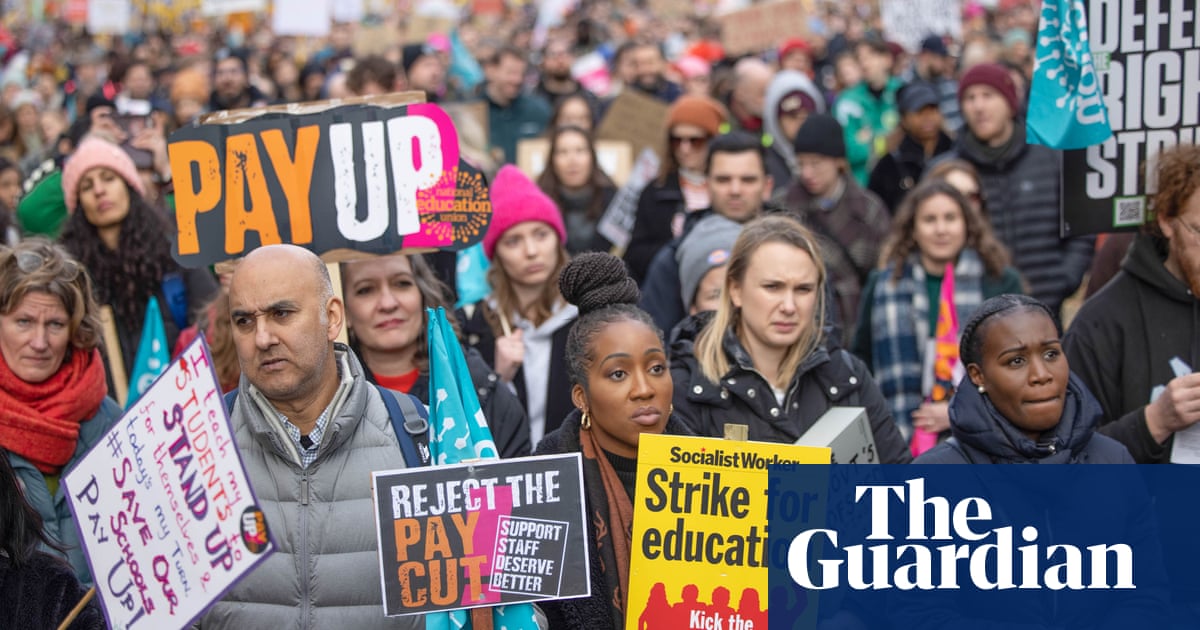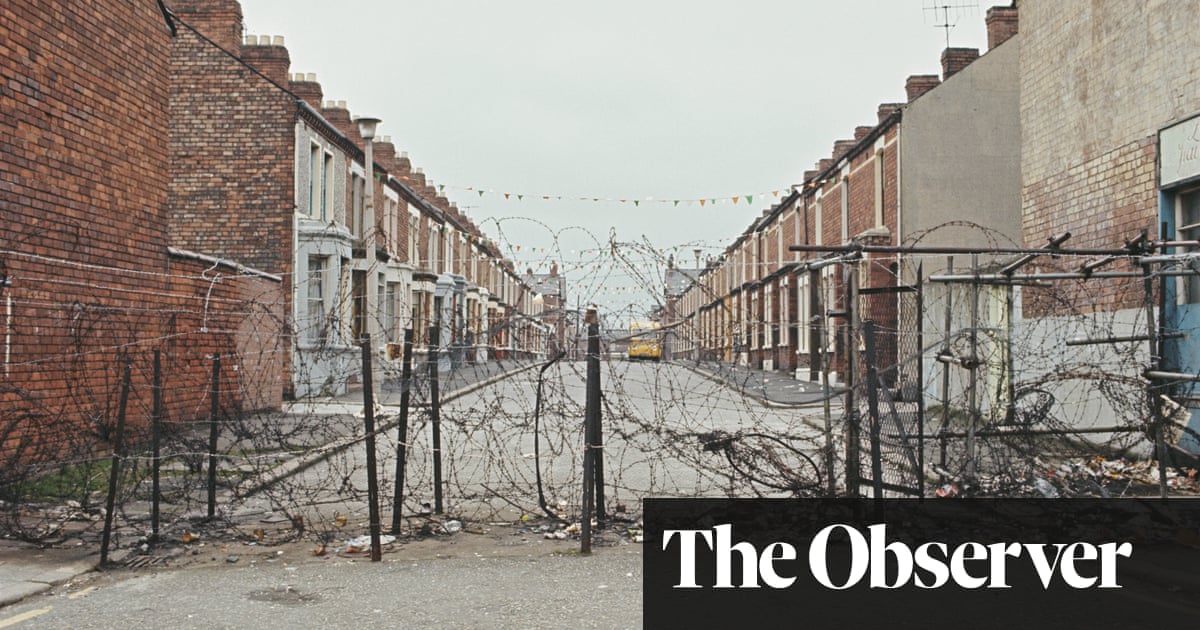
Before he entered Downing Street, David Cameron spent several years campaigning on the slogan “Broken Britain”. “The challenge for the modern Conservatives,” he said in 2008, “is reviving our society.”
Such language seems horribly ironic now. Britain had its problems in 2010 – not least the impact of the 2008 financial crash – but it had strong public services and a visibly improved public realm. In the same way, the Tory government that left office in 1997 may have presided over crumbling public services, but it could at least point to an economic boom. The government that looks set to lose office next month has failed on both counts. “Broken Britain”, it turns out, was a campaign promise.
It felt like it might be fun, in the run up to voting day this Thursday, to catalogue the failures that brought us here: to collate the policy mistakes that created the condition for what looks set to be a punishment election. After spending some time trawling the Guardian’s archive for examples, it rapidly turned out that this wasn’t fun at all.
Brace yourselves. What follows is draining.
The original sin
Let’s start with the cuts. George Osborne, chancellor from 2010 to 2016, announced in his first budget that every area of government apart from the NHS and overseas development would need to cut its budget by an average of 25%. Some of this would be achieved by efficiency savings. Much of it was not: in many areas, the state simply gave up.
So: Sure Start centres, which offered childcare, play, and parenting and employment advice for new mothers, massively had their funding cut, storing up demand for special education and health services as children aged. Connexions, an agency offering advice and support for teenagers, suffered the same fate. Reductions in the legal aid budget meant the number of providers dropped by nearly 60%, while the number of cases funded fell by nearly 90%: vast numbers of people on lower incomes no longer have access to justice.
In an attempt to “devolve the axe” – to make others take the blame for Osborne’s cuts – local government budgets were slashed by about 40% over a decade, resulting in reductions of everything from buses to libraries to bin collections to street lighting (some have been switched off). At the same time, demand for statutory services provided by councils – mainly adult social care – has continued to soar. As early as 2012, councils were sharing the “graph of doom” that showed the cost of those services outstripping council funding by the early 2020s: this is why there are now suddenly quite so many isolated instances of council mismanagement. It probably didn’t help that the government axed the Audit Commission, whose job it was to monitor such things. Or that it gave the public the power to veto council tax increases beyond a ceiling set by MPs.
Government bodies were not the only ones facing cuts: so were welfare recipients. Local housing allowance was capped at the 30th percentile of local rents, meaning that from as early as 2014 people were being priced out of the housing market in many areas and pushed into homelessness. Payments that allowed disabled people to live independent lives were slashed. In 2016, working age benefits were frozen (pensions, of course, were excluded), even as rents and other costs continued to rise. In 2017, the government introduced the two-child benefit cap, claiming it would deter parents who couldn’t afford children from having them. It didn’t. It just cast children into avoidable poverty. By 2020, charities were calling for an investigation into the link between benefit cuts and avoidable deaths.
Young people, with their stubborn refusal to vote Conservative, were hit particularly hard. The educational maintenance allowance, a weekly payment to support 16- to 19-year-olds to stay in education, was scrapped in 2010. Two years later, university tuition fees were tripled to £9,000 a year: these would be repaid in a way that, against all previously known mathematical laws, loaded costs on to students without benefiting either universities or the taxpayer. No matter: in 2016, grants for students from low-income homes were replaced with loans, too.
There are other ways in which this government has, in exactly the manner of which it once accused Labour, failed to fix the roof while the sun shone. Labour’s Building Schools for the Future scheme was another early victim of austerity; by 2023, when ceilings in postwar schools were literally falling in, this was beginning to look like a mistake. This, though, was only one aspect of the vast cuts to departmental capital budgets – in the short term, such things have lower political cost – which has meant a failure to build everything from power stations to flood defences to transport infrastructure to the prison places necessary to match the tougher sentencing rhetoric.
And then there’s environmental policy. After winning a majority in 2015, Cameron vowed to “cut the green crap”. His government abandoned subsidies for larger solar and onshore windfarms, and introduced rules that in effect banned the latter altogether; scrapped its “green deal” home efficiency scheme, which helped pay for home insulation; removed tax incentives for drivers to switch to cleaner cars; and privatised the Green Investment Bank. (There’s more, but that’s quite enough.) By 2022, analysis by Carbon Brief has found, all this had cost the average household as much as £150 a year in increased energy bills.
Within a few months, though, this had been largely forgotten. The prime minister had made a rather bigger geopolitical mistake.
Brexit, and everything after
It may have been an error on Cameron’s part to hold a vote on a potentially nation-wrecking policy he had no desire to carry out to solve an internal party problem. It may also have been a mistake to instruct the civil service not to plan for a vote to leave.
But let’s put all that aside and think instead of everything that has followed. Losing our right to live and work elsewhere on our continent. The loss of British students’ access to the Erasmus exchange programme. The career-ruining barriers now faced by British bands or orchestral musicians hoping to ply their trade in Europe. The loss of the European Medicines Agency or the decline of the City, with the impact this has had for key economic sectors such as pharmaceuticals and finance. All these things hit the professional middle class that once provided a sizeable share of the Tory voting block. That fluttering you hear is the sound of chickens coming home to roost.
This was but a fraction of the damage Brexit did to the Conservative party’s reputation. Consider Theresa May’s lengthy refusal to guarantee the right of the 3.2 million EU citizens who’d made their homes here to remain in Britain, despite the consequences for Britons who lived in Europe. Or the years of debate over whether there’d need to be border posts on the island of Ireland (which went almost entirely undiscussed pre-referendum), or in the Irish Sea (which would split the UK in two). All this because Cameron wanted to neutralise the threat posed by Nigel Farage, a man the bookies have as the overwhelming favourite to be elected the MP for Clacton.
Some of the trends intensified by Brexit, such as hostility to anyone seen as an outsider, were an amplification of a performative cruelty already present in certain parts of government. The “go home” vans were launched by May’s Home Office back in 2013. They were part of a suite of policies known as the “hostile environment”, which aimed to make Britain a harder place to survive in as an illegal migrant, but ended up making it harder to be in as any person of colour, whether British or not. In the most extreme example, the Windrush scandal, the Home Office detained, persecuted and even deported dozens of Black British citizens just because they didn’t have the appropriate piece of paperwork. The Home Office itself had destroyed them.
Whatever its root, though, governmental hostility towards both foreign people and human rights has increased markedly these past few years. The UK has ramped up its visa fees. It’s upped the minimum income requirement required for British people to bring home foreign partners. Less ruinously but more absurdly, the then immigration minister, Robert Jenrick, ordered an asylum centre to paint over murals of cartoon characters, presumably to stop foreign children from plotting to illegally enter the UK because they’d heard it had pictures of Tom and Jerry – a policy as absurd and as arbitrary as Chris Grayling’s unlawful and soon reversed attempt to ban people from sending books to those in prison.
Brexit also unleashed something else: a politics that cared less for the British constitution or rule of law than for near-mystical invocations of the “will of the people” – a will that always accorded, somehow, with the desires of the rightwing press. The results of this have included, but not been limited to, the failure of multiple lords chancellor to defend the independence of the judiciary from attacks by hostile newspapers; Johnson’s unlawful prorogation of parliament; new restrictions on the right to protest; and the Elections Act – a naked attempt to help the governing party.
All these trends have culminated in the Rwanda scheme, in which parliament passed a law declaring that country a safe destination for refugees – in defiance of not just international law but of objective reality, purely so that ministers could be cruel towards some of the most desperate people in the world. This sucked in a vast amount of political energy at a time when poll after poll has shown that voters’ real priorities are the cost of living crisis and the NHS, about which ministers were doing nothing. And it hasn’t even “stopped the boats”.
Things can only get worse
There’s another type of government failure: the things that can’t necessarily be attributed to a single bad policy, but where multiple policies or a failure to act have contributed to a sense the country is going backwards. For instance, in many policy areas, there’s been a creeping centralisation of power in Westminster – coupled with the aforementioned weakening of local government – which has surely contributed to the general sense of alienation from politics that has characterised this election.
There’s also been the repeated failures to get Britain building and price-inflating schemes such as help to buy; house prices have soared and home ownership rates tumbled; and our housing now offers the worst value for money of any advanced economy. This too has been bad for the Tories’ electoral prospects. Those who can’t start families are less likely to grow more conservative – why support capitalism if you can’t accumulate capital? The government has remained unpersuaded to improve the lot of renters, even so.
Wages have stagnated for more than a decade, meaning living standards in the UK have fallen behind those in peer nations. Nearly a fifth of the population are in poverty, including 3.6 million children; more and more families now rely on food banks. There are 74% more people sleeping rough than there were in 2010, and more than 150,000 families are now homeless – a record number. The ONS is considering no longer recording their mortality rates.
Meanwhile, hospital waiting times are at a record high. (The then health secretary, Andrew Lansley, actually scrapped the targets in 2010, but it went so well the government U-turned within 18 months.) The government has attempted to blame this on Covid, and that clearly was a factor – but stories about record waiting times had been a regular feature of the domestic news pages long before any of us ever heard the phrase “novel coronavirus”.
While we’re doing healthcare: ambulance waiting times have soared, in large part due to bottlenecks elsewhere in the health service that leave vehicles queueing outside hospitals. In 2022, more than 500 people died while waiting for one. Demand for GPs’ services has also risen, but the shortage of doctors has meant an increase in practice list sizes and growing difficulty getting an appointment. (Many people have stopped trying, either letting problems fester, which will pile up more costs for the health service down the line, or where possible going private.) NHS dental deserts mean that, in February of this year, a new practice in Bristol made headlines when 1,500 people queued for hours to sign up.
Through all this, the government came up with plans for neither the funding nor workforce of adult social care – May did try; it cost her her majority – and its failure has had a direct impact on the NHS, swallowing much of the recent panicked increase in its funding. Even once you are dead, the waiting lists don’t stop. Covid, cuts and a dodgy computer system have all meant that the time families wait for the grant of probate – access to a late family member’s estate – has increased from a couple of weeks to as much as a year.
All these things have broken Britain – but they’ve created the conditions for an unprecedented Tory wipeout, too. The Faustian bargain offered by previous iterations of the Conservative party was that it might damage the social fabric, but it could, at least, make the middle classes rich. After 14 years of alternating lethargy and crisis, that very clearly no longer applies.
And the rest
The list above is in no way comprehensive: my word count was simply not that long. I’ve not even mentioned academisation, the radical overhaul of England’s school support and accountability structures, because there’s some evidence standards have improved (even if some studies have found that council schools outperform academies). Nor have I risked getting lost in the weeds of the complex and disastrous deckchair-rearranging exercise that were Lansley’s NHS reforms over half a decade, which burned through vast quantities of goodwill and energy for no clear benefit.
I’ve missed the 2020 A-levels scandal in which students’ lives were wrecked by a badly designed algorithm. And the exclusion of several million self-employed people from any and all pandemic support. And Grayling’s privatisation of probation, which increased the risk to the public so markedly that it was reversed by his successors. And the ministerial merry-go-round in which the UK’s already brief average ministerial tenure collapsed from a couple of years to only eight months, meaning that even those less out of their depth than Grayling were never likely to get a handle on the job. I’ve not even mentioned Liz Truss.
But the point is clear: in a vast number of ways, in almost every realm of government activity, this lot have made life worse. The policies referred to in every sentence in this article have damaged untold thousands of lives. The Conservative party has created exactly the broken Britain it claimed its mission was to repair.
You may not think this Labour party deserves to win. But it’s hard to refute the idea that, after the last 14 years, the Tories deserve to lose.
Jonn Elledge’s new book, A History of the World in 47 Borders: The Stories Behind the Lines on Our Maps, is out now












